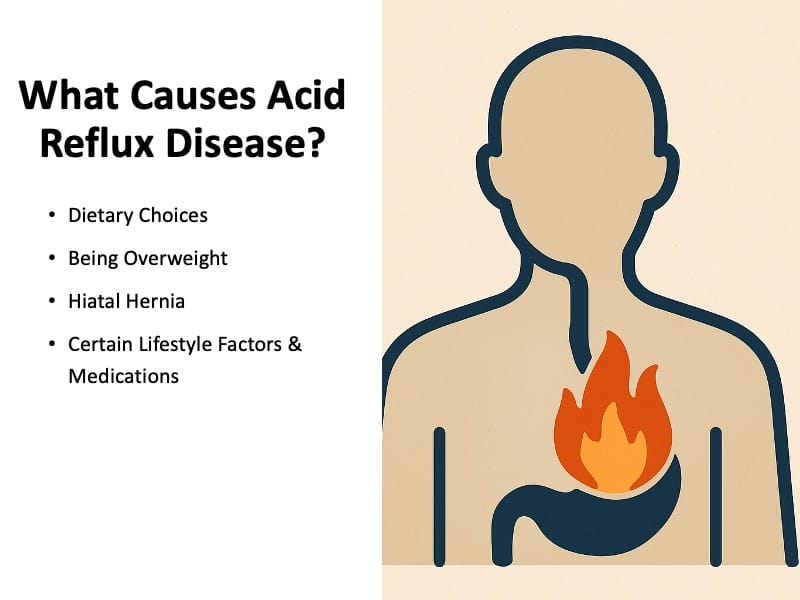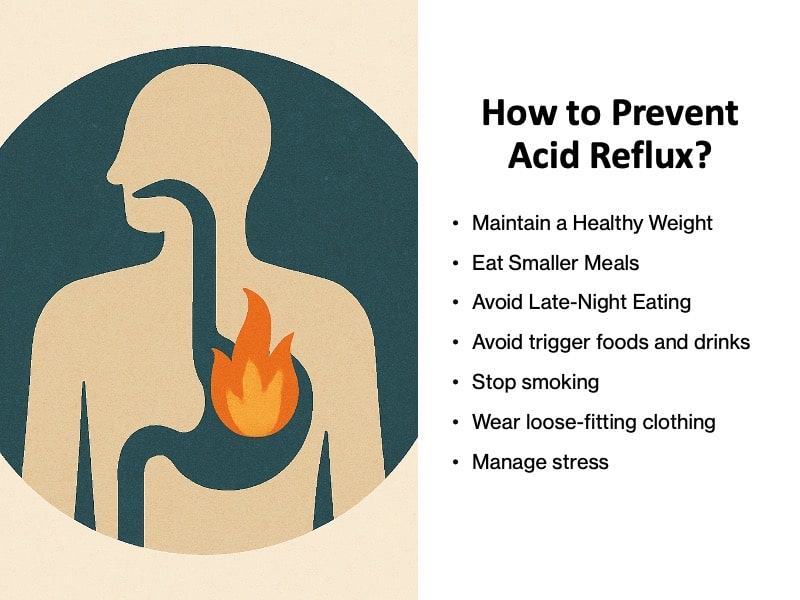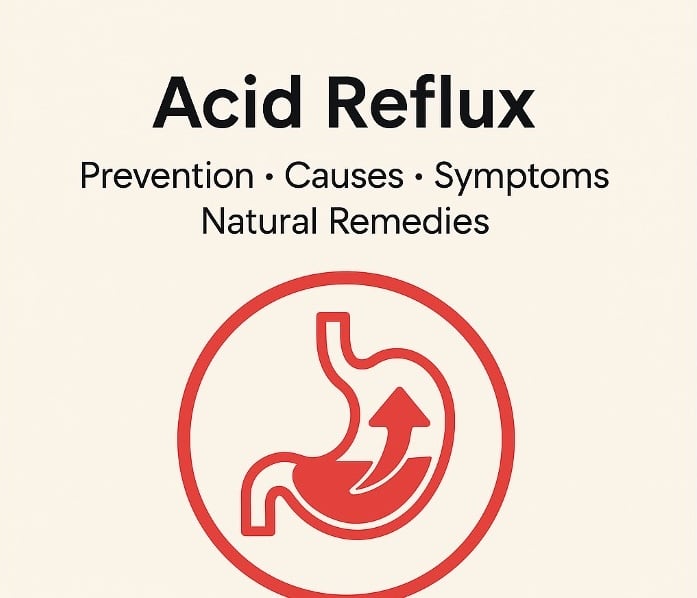Acid Reflux: Prevention, Causes, Symptoms & Natural Remedies
Acid reflux, a condition marked by the backward flow of stomach acid into the esophagus, affects millions of individuals worldwide, presenting not just as a source of discomfort but as a disruptor of daily life.
Characterized by symptoms such as heartburn, regurgitation, and sometimes even difficulty swallowing, this common ailment, also known as gastroesophageal reflux disease (GERD) when occurring frequently, has roots in both lifestyle and physiological factors.
While conventional medicine offers various treatments, an increasing number of people are turning towards natural remedies for acid reflux to find relief.
What is Acid Reflux?
Acid reflux, commonly referred to as gastroesophageal reflux disease (GERD), occurs when the lower esophageal sphincter, the valve connecting the stomach to the esophagus, fails to close properly.
This malfunction allows stomach acid to escape into the esophagus, leading to the characteristic burning sensation known as heartburn.
GERD is a prevalent condition, affecting an estimated 20% of Americans, with certain factors increasing its likelihood.
Being overweight, pregnancy, the use of specific medications such as calcium channel blockers or some asthma treatments, and smoking have all been identified as risk factors.
While for some, acid reflux may be a sporadic experience, for others, it represents a persistent issue necessitating medical management to prevent complications and improve quality of life.
Symptoms of Acid Reflux
The symptoms of acid reflux can range from mild discomfort to debilitating sensations that interfere with daily activities and sleep quality.
The most well-known symptom is heartburn, which is a burning pain or warmth in the chest, often after eating or when lying down. This occurs as stomach acid irritates the lining of the esophagus.
Another hallmark sign is regurgitation, which refers to the sour or bitter-tasting fluid backing up into the throat or mouth.
This often accompanies belching or a sensation of food coming back up.
Chronic coughing, hoarseness, or a sore throat, especially in the morning, can also indicate GERD. These symptoms arise when acid irritates the upper airways or vocal cords, a condition sometimes called laryngopharyngeal reflux (LPR).
Other symptoms include:
- Chest pain (non-cardiac)
- Bloating and gas
- Difficulty swallowing (dysphagia)
- Feeling of a lump in the throat (globus sensation)
- Excessive salivation or postnasal drip
- Worsened asthma or wheezing
In some cases, acid reflux may present silently without heartburn, a condition known as silent reflux, making it more difficult to detect and treat without professional evaluation.
Persistent symptoms, especially when combined with weight loss, anemia, or trouble swallowing, could indicate a more serious condition like esophagitis or Barrett’s esophagus.
These require immediate medical attention to prevent further complications.
Recognizing the wide spectrum of GERD symptoms is critical for early intervention and effective long-term management.
What Causes Acid Reflux Disease?

Acid reflux disease, or GERD, develops when the lower esophageal sphincter (LES) weakens or relaxes inappropriately, allowing stomach contents to flow back into the esophagus.
This dysfunction of the LES can be influenced by multiple factors, including diet, lifestyle, medications, and anatomical abnormalities.
Dietary Choices
Certain dietary choices, such as consuming excessive caffeine, alcohol, chocolate, spicy foods, and fatty meals, can weaken the LES or increase gastric acid production.
These reflux triggers are well-established contributors to GERD symptoms, especially when consumed close to bedtime (Zalvan et al., 2017).
Being Overweight
Obesity also increases intra-abdominal pressure, making reflux more likely. A systematic review concluded that increased body mass index (BMI) correlates strongly with GERD severity and frequency (Hampel et al., 2005).
Hiatal Hernia
A hiatal hernia, where a portion of the stomach pushes through the diaphragm into the chest cavity, is one common contributor to chronic acid reflux (Kaltenbach et al., 2006).
Certain Lifestyle Factors & Medications
Other risk factors include smoking, which impairs LES function and reduces salivary bicarbonate secretion, and medications like NSAIDs, calcium channel blockers, and sedatives, which can either relax the LES or irritate the esophageal lining.
Stress and poor sleep may indirectly worsen GERD symptoms by altering digestive patterns and pain perception, though more research is still needed to fully understand these links.
Understanding the many causes of acid reflux is critical for developing an effective, personalized strategy to manage symptoms and prevent progression to more serious conditions such as esophagitis or Barrett’s esophagus.
How to Prevent Acid Reflux from Developing

Preventing acid reflux begins with proactive lifestyle changes that reduce pressure on the lower esophageal sphincter (LES) and minimize the conditions that promote reflux.
Maintain a Healthy Weight
One of the most effective strategies is maintaining a healthy weight.
Excess abdominal fat increases intra-abdominal pressure, which can force stomach acid upward into the esophagus.
A 2006 meta-analysis found a clear link between higher BMI and increased GERD risk (Hampel et al., 2005).
Eat Smaller Meals
Eating smaller, more frequent meals instead of large meals helps ease digestion and reduce the risk of LES dysfunction.
Overeating stretches the stomach and increases the chance of acid escaping.
Avoid Late-Night Eating
Avoiding late-night meals is another critical step.
A main reason late-night meals can promote acid reflux is that lying down too soon after eating allows gravity to work against your digestive system.
Experts recommend finishing your last meal at least 2–3 hours before bed to allow for proper gastric emptying.
Elevating the head of the bed by 6–8 inches can also reduce nighttime reflux by keeping stomach acid from flowing upward during sleep.
Additional Acid Reflux Prevention Tips
Additional preventive strategies include:
- Avoid trigger foods and drinks: Limit intake of spicy foods, alcohol, coffee, citrus fruits, chocolate, fried foods, and carbonated beverages.
- Stop smoking: Nicotine weakens the LES and increases acid production.
- Wear loose-fitting clothing: Tight waistbands can compress the stomach and trigger reflux episodes.
- Manage stress: Chronic stress may worsen symptoms by disrupting digestion and increasing esophageal sensitivity.
For individuals at risk of developing GERD or experiencing occasional symptoms, these prevention strategies can significantly reduce the likelihood of acid reflux becoming a chronic condition.
Best Natural Remedies for Acid Reflux

Acid reflux is a fairly common problem for many people, but it can be managed with a few lifestyle changes.
Remove Trigger Foods
A primary solution for managing acid reflux involves making adjustments to your diet.
Research indicates that diet plays a role in managing gastroesophageal reflux disease (GERD), and diets high in fat, caffeine, and acidic foods are commonly implicated as significantly contributing to the risk of developing GERD symptoms (Eusebi et al., 2018).
Note: Harvard Health Publishing suggests avoiding trigger foods like spicy food, tomatoes, garlic, tea, onions, chocolate, and alcohol. They also recommend that you try eating slowly and avoiding carbonated beverages, which make you burp.
By identifying and modifying consumption patterns that aggravate reflux symptoms, individuals can adopt a GERD-friendly diet, which emerges as an effective natural remedy.
The findings support the integration of dietary strategies, such as reducing the intake of trigger foods and incorporating alkaline and fibrous foods, as foundational elements in mitigating the discomfort and potential complications associated with acid reflux.
If you suffer from regular bouts of acid reflux, you can try asking your doctor about a specialized GERD diet.
Hopkins Medicine says this can involve high-fiber foods like whole grains and vegetables, alkaline foods like bananas and nuts, and watery foods like celery and watermelon to dilute stomach acid.
This evidence-based approach not only aligns with the broader spectrum of natural remedies for GERD but also highlights the potential for individuals to improve their quality of life significantly through informed dietary choices.
Consume Alkaline Foods & Drinks
Integrating alkaline solutions into your diet, such as certain foods, teas, and specifically alkaline water, can play a pivotal role in managing and potentially reducing the symptoms of acid reflux.
Alkaline substances work by neutralizing excess stomach acid, which is often the culprit behind the discomfort and damage caused by reflux.
By adopting an alkaline-rich diet, including foods and drinks like wheatgrass, ginger tea, and alkaline water, individuals can create a more favorable digestive environment.
Wheatgrass
Wheatgrass: As an alkaline food, wheatgrass stands out for its ability to help balance the stomach’s pH levels.
Incorporating wheatgrass into your diet, for instance, through options like Brightcore Sweet Wheat Organic Wheat Grass Juice Powder, provides a convenient and effective means to harness its benefits.
Wheatgrass not only contributes to neutralizing stomach acid but also offers a suite of nutrients that support overall health.
Last update on 2025-07-02 / This article includes affiliate links/Images via Amazon Product Advertising API. I may earn commissions on purchases made through these links.
Ginger Tea
Ginger Tea: Known for its natural digestive properties, ginger tea acts as a gentle remedy for soothing digestive tract irritations.
Its consumption can alleviate symptoms by calming the stomach and reducing the likelihood of acid reflux episodes.
Beyond its immediate soothing effects, ginger tea promotes digestive health, making it a valuable addition to daily routines aimed at managing GERD.
Alkaline Water
Alkaline Water: Expanding on the theme of alkaline remedies, alkaline water has potential benefits in the context of acid reflux.
Alkaline water, typically defined by a pH level above 7, can help neutralize stomach acid more effectively than regular drinking water.
Research, such as the study by Koufman and Johnston (2012), suggests that alkaline water with a pH of 8.8 can deactivate pepsin, the primary enzyme that causes damage in acid reflux conditions.
Therefore, drinking alkaline water may offer a double advantage: it can reduce acid reflux symptoms and protect the esophagus from pepsin-induced damage.
Manage Stress Levels
Stress can aggravate acid reflux by increasing stomach acid production and delaying gastric emptying.
Chronic stress also heightens sensitivity to reflux symptoms, even when acid exposure is minimal.
Incorporating natural stress-reducing techniques like diaphragmatic breathing, progressive muscle relaxation, daily mindfulness, and prayer can reduce the physiological triggers of reflux.
Regular mobility exercises or gentle stretching, especially poses that avoid abdominal compression, may further assist in calming the nervous system and reducing symptom frequency.
Although I am not a fan of yoga due to its pagan roots and spirituality, a study published in Complementary Therapies in Medicine found that yoga significantly reduced GERD symptoms in participants practicing specific breathing and movement routines (Kaswala et al., 2013).
Fortunately, you don’t need to practice spiritual yoga to get acid reflux prevention benefits from a good stretching and mobility routine!
Achieve and Maintain a Healthy Weight
Weight loss is one of the most powerful non-pharmaceutical interventions for acid reflux.
Excess abdominal fat increases intra-abdominal pressure, promoting reflux by weakening the lower esophageal sphincter.
Even modest weight loss can dramatically improve symptom control.
In a large prospective cohort study, weight loss was strongly associated with decreased GERD symptom severity (Jacobson et al., 2006).
Some natural ways to lose weight include:
- Eating whole, unprocessed foods in appropriate portions
- Walking after meals to improve digestion
- Practicing mindful eating to avoid overeating
- Staying hydrated with water (but not large amounts during meals)
By incorporating these lifestyle practices, individuals can reduce the mechanical and hormonal factors that contribute to GERD progression.
Additional Acid Reflux Treatment Options
With the right combination of lifestyle adjustments and medical support, many individuals can significantly reduce GERD symptoms and return to a normal, comfortable life.
However, in more persistent or severe cases, medical intervention, including medications or surgery, may be necessary to prevent complications and improve long-term outcomes.
OTC and Prescription Medications
A variety of over-the-counter (OTC) and prescription medications are available to help control acid reflux, especially when symptoms interfere with daily function or cause esophageal damage.
Antacids are the most common OTC treatment. They work by quickly neutralizing stomach acid, providing fast relief from heartburn.
However, antacids do not promote esophageal healing or address the root causes of reflux.
H2 blockers, such as ranitidine (now mostly discontinued) or famotidine, reduce the amount of acid the stomach produces.
Although slower to act than antacids, H2 blockers provide longer-lasting relief and are available both OTC and by prescription.
In today’s digital world, many patients also prefer to order prescription medication online through licensed telehealth providers for added convenience and privacy.
Proton pump inhibitors (PPIs) like omeprazole or esomeprazole offer even more potent acid suppression and are often used for moderate to severe GERD.
These drugs are effective for promoting esophageal healing, but long-term use should be monitored by a healthcare provider due to potential side effects such as nutrient malabsorption or increased risk of gastrointestinal infections.
Always consult with a healthcare professional to determine the most appropriate medication strategy based on symptom severity and underlying conditions.
Surgical Solutions
For individuals whose symptoms remain unmanageable despite medication and lifestyle modifications, surgical options may provide long-term relief.
Endoscopic procedures and fundoplication surgeries are designed to strengthen the lower esophageal sphincter or prevent acid from flowing back into the esophagus.
These techniques are typically reserved for those with chronic, medication-resistant GERD or anatomical abnormalities such as a hiatal hernia.
While surgery can be effective, it also carries risks and should only be considered after all conservative treatments have been explored.
Final Thoughts: How to Get Rid of Acid Reflux
Getting rid of acid reflux requires more than masking symptoms, it demands a holistic, consistent approach that targets root causes and restores digestive balance.
For many people, sustainable relief begins with simple but powerful lifestyle changes.
Adjusting your diet to avoid trigger foods, eating mindfully, managing stress, and achieving a healthy weight can dramatically reduce reflux frequency and intensity.
Natural remedies for acid reflux, like ginger tea, alkaline water, and wheatgrass, can support these efforts and promote a calmer digestive system.
When symptoms persist or escalate, medical options like H2 blockers, proton pump inhibitors, or surgical interventions may be necessary.
The best strategy to get rid of acid reflux naturally and for good involves combining evidence-based nutrition, strategic stress reduction, physical activity, and when needed, professional medical support.
With commitment and consistency, most people can significantly reduce or even eliminate their symptoms and regain control of their health and daily comfort.
Frequently Asked Questions
This website does not provide medical advice. This website site does contain affiliate links, and purchases may earn a commission.
Read my Medical Disclaimer, Review Disclaimer, and Publishing Policies for more details. Use of this site indicates acceptance of these terms.




